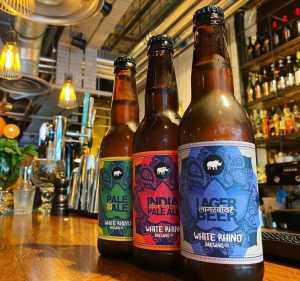Back in 2012, during the high-spirited early days of London’s brewing boom, there was one story you heard wherever you went. You barely had to walk into a bar before a man would be earnestly explaining how India Pale Ale (IPA) got its name.
The exact details have since escaped me, I’m afraid, but I’m pretty sure it involved 19th-century British brewers adding extra hops or booze or using special magical barrels to ensure that the beer didn’t go manky en route to India. Whatever it was, the essence was true: IPA definitely travelled from Britain to India.
I couldn’t help thinking of this tale when I visited Babur, a restaurant not far from my home, recently. Babur is one of London’s genuinely elite Indian restaurants, but it was the beer that caught my eye: White Rhino IPA, delicious and brewed in the outskirts of Gwalior in actual India. An IPA exported from India to England? If only I could go back to 2012, I thought. I could have really blown some minds.
We brewed a reverse IPA!
“It’s a cool idea, right?” says Ishaan Puri, owner of White Rhino, when I put this notion to him recently. “Everybody says it: we brewed a reverse IPA! It’s a great talking point, but it doesn’t get you through seven years of exporting to the UK. We send it to the UK because it’s sellable there.”
This sort of sober seriousness would have silenced most craft beer bars back in the day, but things have changed a lot in the last decade and more – in India as much as the UK. When Ishaan returned home in 2009 from a period of living abroad that included a stint studying economics at the University of Pennsylvania, he found a country that was, as he puts it, “premiumising” in alcohol and beyond.

White Rhino's range
It was an environment ripe for craft beer, and a couple of brewpubs had opened – but White Rhino, founded in 2016, was the first craft beer brewery along American or British lines to open, designed to produce packaged beer for sale near and far. Ishaan hired a British brewer, James Garstang, formerly of The Kernel, and started brewing what must have been genuinely revolutionary beer in Indian terms.
The years since have brought plenty of challenges. Indian craft beer has moved forward, but for various reasons, both cultural and bureaucratic, things have perhaps not evolved as fast as Ishaan might have liked. In India, he focuses on the big urban markets – Delhi, Mumbai, Bangalore, Kolkata, Chennai, Hyderabad – and now exports to Nepal and the UK.
He remains resolutely positive. “We’re not even 15 years into India’s craft beer journey,” he says. “Even in the US, there were a lot of policy hurdles and ups and downs back in the day, but people had to fight to make the change. So we’re in that space, and we’re finding our footing, and eventually things will settle down.”
White Rhino’s beer seems to be finding its way, notably in London
The UK, of course, has had its own brewing setbacks in the past few years, but White Rhino’s beer seems to be finding its way, notably in London. You can try his beer in many of the capital’s best restaurants, including Darjeeling Express – and the impact of White Rhino is felt elsewhere in London too.
James Garstang returned from India in 2020 and is now powering Forest Road, one of the city’s most upwardly mobile breweries, while Nidhi Sharma, who worked at White Rhino back in 2018, is part of the team at the soon-to-open Guinness Brewery in Covent Garden.
Ishaan, meanwhile, is pondering new markets – those geographically close to the UK, such as France or the Netherlands, or with an Indian connection, like Canada, Australia, or the US. Sending IPA to the USA, the modern home of the style? That really would be something to talk about.
